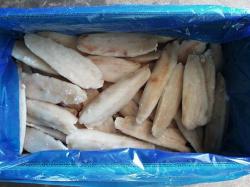First Blue Whiting Enters MSC Assessment
August 13, 2014 | 3 min to read

A large group of Dutch, German, French, English, Lithuanian, Danish and Irish pelagic fishers has entered the first blue whiting fishery into MSC assessment. This is the third multi-national assessment of a pelagic fishery in recent months marking a growing trend of cross-border cooperation in the pelagic sector. By working together, national fishing organisations are reducing their assessment costs and collaborating to improve fishery management.
“It has been our longstanding intention to get our blue whiting fishery under MSC certification.” said Gerard van Balsfoort, president of the Pelagic Freezer-trawler Association, on behalf of all fleets concerned, “Now the stock is doing very well and the development of an effective management plan for this fishery is entering its final phase, we are confident that the MSC assessment can be concluded successfully.”
Early adopters
Camiel Derichs, MSC Director Europe welcomed the group’s move: “It is great to see these North Atlantic blue whiting fisheries enter assessment against MSC standards. Historically, the early adopters, the first to bring a new species into MSC assessment, have realized the greatest benefit from certification. These fisheries have invested a great deal in the quality of their fish and I hope that they will be successful and that their success will inspire other blue whiting fisheries to consider MSC assessment.”
Over recent years, stocks of blue whiting have risen as new management measures have taken effect in combination with strong recruitment of the stock. Between them, the companies under assessment caught 73,000 tonnes of blue whiting in 2013, which is mostly exported to Africa and China as whole frozen fish for direct human consumption or for further processing into frozen block fillets.
A versatile fish
Blue whiting is a small (30cm) white fish, related to cod. With off-white flesh, it has traditionally been used to produce fishmeal. The fleets under certification have increasingly targeted this fish for human consumption purposes only. Blue whiting for human consumption is typically used to make surimi, however, over the last 15 years, improvements in fishing techniques and freezing and storage technologies have also resulted in a growing demand for whole-frozen and frozen filleted blue whiting.
Getting involved
The assessment will be carried out by independent auditors MacAlister Elliott and Partners (MEP) and should be completed to include the catches in the 2015 fishing season, starting early in the year. Anyone with an interest in the fishery is invited to participate and MEP have already identified 40 stakeholders. Anyone who would like to participate should contact Chrissie Sieben on chrissie.sieben@macalister-elliott.com
Marine Stewardship Council: The Marine Stewardship Council (MSC) is an international non-profit organisation set up to help transform the seafood market to a sustainable basis. The MSC runs the only certification and ecolabelling programme for wild-capture fisheries consistent with the ISEAL Code of Good Practice for Setting Social and Environmental Standards and the United Nations Food and Agricultural Organisation Guidelines for the Eco-labelling of Fish and Fishery Products from Marine Capture Fisheries. These guidelines are based upon the FAO Code of Conduct for Responsible Fishing and require that credible fishery certification and eco-labelling schemes include:
- Objective, third-party fishery assessment utilising scientific evidence;
- Transparent processes with built-in stakeholder consultation and objection procedures;
- Standards based on the sustainability of target species, ecosystems and management practices.
The MSC has regional or area offices in London, Seattle, Tokyo, Sydney, The Hague, Glasgow, Beijing, Berlin, Cape Town, Copenhagen, Halifax, Paris, Madrid, Moscow, Stockholm, Santiago, Sao Paulo, Singapore and Reykjavik.
In total, over 300 fisheries are engaged in the MSC programme with 238 certified and around 100 under full assessment. Another 40 to 50 fisheries are in confidential pre-assessment. Together, fisheries already certified or in full assessment record annual catches of close to ten million metric tonnes of seafood. This represents over eleven per cent of the annual global harvest of wild capture fisheries. Certified fisheries currently land over seven million metric tonnes of seafood annually – close to eight per cent of the total harvest from wild capture fisheries. Worldwide, more than 20,300 seafood products, which can be traced back to the certified sustainable fisheries, bear the blue MSC ecolabel.
For more information on the work of the MSC, please visit www.msc.org
Source: Marine Stewardship Council
